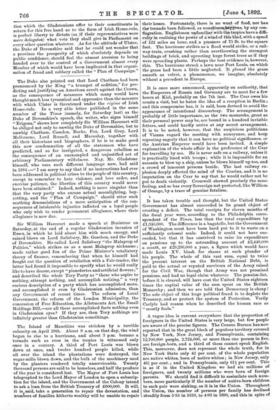The Island of Mauritius was stricken by a terrible calamity
on April 29th. About 9 a.m. on that day, the wind began to rise to a hurricane, and about 3 p.m. became a tornado such as even in the tropics is witnessed only once in a century. A third of Port Louis was blown down at once, and twelve hundred people killed, while all over the island the plantations were destroyed, the sugar-mills blown down, and the bulk of the machinery used by the planters rendered totally unserviceable. Twenty thousand persons are said to be homeless, and half the produce of the year is considered lost. The Mayor of Port Louis has telegraphed to the Lord Mayor of London to open a subscrip- tion for the island, and the Government of the Colony intend to ask a loan from the British Treasury of £600,000. It will, it is, said, take a generation to repair the devastation, and numbers of families hitherto wealthy will be unable to repair their losses. Fortunately, there is no want of food, nor has the tornado been followed, as sometimes;happens, by any con- flagration. Englishmen unfamiliar withthe tropics have a diffi- culty in realising the power of a wind of this kind, with a speed of 122 miles an hour, and a pressure of 75 lb. to the square foot. The hurricane strikes as a flood would strike, or a rail- way-train, crushing rather than overthrowing the strongest buildings of brick, and uprooting huge forest trees as if they were spreading plants. Perhaps the best evidence is, however, this. The hurricane struck a lawn near Port Louis, on which the grass had been a little neglected. It planed the grasa smooth as velvet, a phenomenon, we imagine, absolutely without a precedent in Europe.


































 Previous page
Previous page